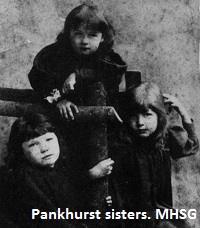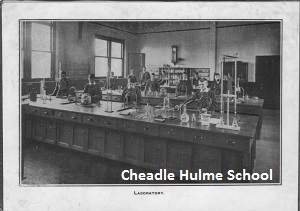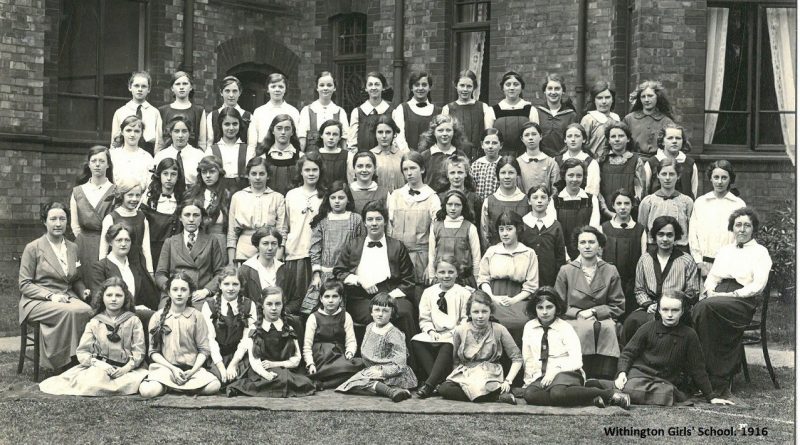Roots of Revolution: a history of education in Manchester and Stockport
We need to know our history. Blacks, whites, immigrants, and natives – we must know the past to make the future work. In the wake of Black Lives Matter movement, pressure is mounting on the government to review the national curriculum and revolutionise the teaching of black history by making it mandatory for all pupils in schools in England. Meanwhile, we are re-examining the history of the five local schools in Manchester and Stockport, and looking at the ‘revolutions’ they caused by their introduction of education for girls, for poor children, and co-education – all between the sixteenth to nineteenth centuries.
While The Manchester Grammar School (MGS) has been around since Henry VIII (he of the mass wife disposal) sat on the throne of England, and has lived through both bubonic plague and civil war, their neighbour Withington Girls’ School (WGS) is by comparison a much more youthful sibling, three centuries younger. The reason for this is, of course, that in 1515 when MGS was founded by Bishop Hugh Oldham, not even visionaries dreamed of providing an education for girls. Despite its relatively recent establishment, even the founders of WGS were still far ahead of their time in their desire to provide educational opportunities for young ladies that extended beyond elocution and sewing. In 1890 a small group of Manchester professionals decided that they wanted a school which provided the same academic standards for their daughters as their sons had been afforded for centuries. Within the founding principles of Withington Girls’ School, they stipulated that: ‘all girls should be taught the Natural Sciences, as it constitutes excellent intellectual training; there should be more physical exercise and practical work than usual in girls’ schools’.
Although the establishers of WGS were undertaking revolutionary work, they had in fact narrowly been beaten by another group of visionaries who believed woman could make a difference somewhere other than the kitchen. Manchester High School for Girls had already been established sixteen years earlier in order to ‘provide for Manchester’s daughters what has been provided without stint for Manchester’s sons’, and the school celebrated its 140th anniversary last year. This narrow victory for Man High established a rivalry between the two schools which continued throughout the 20th century to this day. In fact, if you ask anyone from WGS which school was established first, they are guaranteed to say, with every certainty of being absolutely right, that it was Withy Girls’.
 Ladies from both WGS and MHSG tend to be well aware of the historic inequalities which their schools battled, and two of Manchester High’s most famous alumni, Sylvia and Christabel Pankhurst, were instrumental in carrying on the fight for women’s equality once they left school. 44 years after MHSG was founded, women finally gained the vote, due in large part to the struggles of the Suffragettes, of which Christabel was leader.
Ladies from both WGS and MHSG tend to be well aware of the historic inequalities which their schools battled, and two of Manchester High’s most famous alumni, Sylvia and Christabel Pankhurst, were instrumental in carrying on the fight for women’s equality once they left school. 44 years after MHSG was founded, women finally gained the vote, due in large part to the struggles of the Suffragettes, of which Christabel was leader.
Despite not admitting girls, MGS was also something of a novelty when it was established, as the foundation charter precisely stated that ‘no male child was to be excluded from any part of the country, provided he suffered from no contagious disease or infection’. This meant that, apart from unfortunate boys suffering from severe cases of chicken pox, the Manchester Free Grammar School admitted everyone, including poor boys for whom a serious academic education had previously not been an option. In order to assist the poorest scholars, everyone would donate a penny on entering the school, and two of the least wealthy members of the school would receive this is a fee in return for cleaning the school. Nowadays, this neat system has been replaced with bursaries. The financially equalizing policy of Man Grammar was not so unusual in itself, as church schools founded around this time also admitted less wealthy boys, but MGS, although it was originally associated with Manchester Cathedral , was established to be a free grammar school with no religious ties. In fact, in a second charter written in 1525, it was precisely stated that a monk could no longer be appointed to the post of High Master.
Although MGS has stood strong through 5 centuries and 26 different monarchs (if we controversially count the Cromwells in the ranks of royalty), there is another local school that has seen even more action. Stockport Grammar School is the oldest operating institution of learning in the North of England and has been around since 1487. A lot has changed since then – originally there was only one teacher who doubled as a priest and taught only grammar as well as chanting masses. Soon the school was teaching Greek, Latin, reading, writing, grammar and arithmetic to 150 boys, with still only two (probably very overworked and underpaid) teachers. For five centuries life at SGS continued calmly, with the pupils and teachers growing in numbers, and the curriculum expanding. But in 1980 the momentous decision to go co-ed was made, doubtless shaking up the male population in no small way. Man High and WGS probably started finding potential students suddenly tempted away by the opportunity for a bit of mingling with the opposite sex.
 In actual fact, the two single sex girls’ schools had faced the co-ed threat since their creation, as Cheadle Hulme had already been around since 1855, and it was “open to all children, regardless of gender”. Until 1921 (when the school decided to become part of the government’s education programme) however, Cheadle Hulme did have other restrictions on who could attend. CHS was originally set up to be “The Manchester District School for Orphan and Necessitious Children of Warehousmen and Clerks” – and it did more or less what it said on the tin. The school was established following a successful London model – the Southerners having beaten us to the idea- in order to provide an education for the children of deceased workers. With the industrial revolution in full swing working in inner-city factories was extremely risky so CHS provided some much needed security for labouring families, and it even functioned as a boarding school originally. Although the boarding element has now disappeared, the school is of course still going strong.
In actual fact, the two single sex girls’ schools had faced the co-ed threat since their creation, as Cheadle Hulme had already been around since 1855, and it was “open to all children, regardless of gender”. Until 1921 (when the school decided to become part of the government’s education programme) however, Cheadle Hulme did have other restrictions on who could attend. CHS was originally set up to be “The Manchester District School for Orphan and Necessitious Children of Warehousmen and Clerks” – and it did more or less what it said on the tin. The school was established following a successful London model – the Southerners having beaten us to the idea- in order to provide an education for the children of deceased workers. With the industrial revolution in full swing working in inner-city factories was extremely risky so CHS provided some much needed security for labouring families, and it even functioned as a boarding school originally. Although the boarding element has now disappeared, the school is of course still going strong.
All five of these visionary schools were founded to provide an academic education for a certain segment of society that had previously been overlooked, and they all have different but equally unusual stories to tell about their past.








Hello,
I am seeking some history information on schools in Manchester, 19th Century. I read your article above and it was informative. Although I was wondering when did these schools actually founded, such the Manchester Free Grammar school and the Manchester high School for girls. The reason I ask is I am a young writer, not published but am currently writing a storyline on late 19th Century Manchester. There are certain topics that ar part of my background story and one of them is education, was it available, what employment came of it. The years i am looking at is late 19th century from 1890’s onwards. From what I have briefly read, education facilities in Manchester offered women of all ages a different life than marriage, inspiring the women’s revolution.
Can you help me, please. Finding good accurate and authentic resources has become an issue, as google can only provide so much.
Please, you can be contacted on the email address below. Any information you may have will be useful and help and be much appreciated. Thankyou.
Dear Julie,
Thank you for your interest in the article. Both girls’ schools (WGS and MHSG) were founded at the end of the 19th century and were instrumental in changing perception of education for women. MGS (school for boys) was founded much earlier, in 1515. You can find a lot of information on school’s website or you can try contacting schools directly. Keep us posted about your progress.
Good luck with your research!